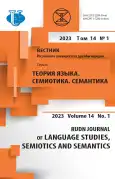Seventy-Year History of Sino-Russian Relations through the Prism of Borrowed Vocabulary
- Authors: Nedopekina E.M.1, Cong H.1
-
Affiliations:
- Peoples’ Friendship University of Russia, (RUDN University)
- Issue: Vol 14, No 1 (2023)
- Pages: 156-170
- Section: FUNCTIONAL GRAMMAR AND SEMANTICS
- URL: https://journal-vniispk.ru/2313-2299/article/view/323455
- DOI: https://doi.org/10.22363/2313-2299-2023-14-1-156-170
- EDN: https://elibrary.ru/PVYCTM
- ID: 323455
Cite item
Full Text
Abstract
The purpose and objectives of this study relate to the field of interlanguage contacts and, in particular, to the observation of the process of lexical borrowing as a result of the interaction of non-closely related Russian and Chinese languages. This article discusses the question of the correlation between the nature of Sino-Russian relations and some processes in the vocabulary of the languages of these states. The objective of the study is to identify patterns in the change in the volume and features of borrowed vocabulary, depending on the specifics of the development of interstate relations between China and the USSR, and later the Russian Federation in the period from 1949 to 2022. Within 70 years since the establishment of diplomatic contacts between China and the Soviet Union in 1949, relations between the two countries have gone through three different stages - from warm to cool, and then a period of strategic cooperation - in all areas of public life: humanitarian, scientific, educational, political, military and economic. During these three different periods, the number and nature of Chinese borrowings in Russian and Russian borrowings in Chinese also underwent significant changes. They are reflected in the features of the process of adaptation of borrowed words at the phonetic, grammatical and semantic levels. The frequency of borrowed words use in the period under review in the media texts of both countries is of particular interest. Statistical data on the use of lexemes of Russian origin in Chinese and lexemes of Chinese origin in Russian, obtained from the data of national corpora of the two languages, allow to draw some conclusions about the popularity of certain foreign words at each of the three identified historical stages.
About the authors
Ekaterina M. Nedopekina
Peoples’ Friendship University of Russia, (RUDN University)
Author for correspondence.
Email: nedopekina-em@rudn.ru
ORCID iD: 0000-0002-5922-3669
PhD in Philology, PhD in Slavic Studies, Associate Professor of the Department of General and Russian Linguistics, Faculty of Philology
6, Miklukho-Maklaya str., Moscow, Russian Federation, 117198Ha Cong
Peoples’ Friendship University of Russia, (RUDN University)
Email: 1042218071@rudn.ru
ORCID iD: 0000-0001-9460-9957
PhD student at the Department of General and Russian Linguistics, Faculty of Philology
6, Miklukho-Maklaya str., Moscow, Russian Federation, 117198References
- Weinreich, U. (1953). Languages in Contact, Findings and Problems. New York: Linguistic Circle of New York.
- Li, N. (2018). “One belt, one road” initiative as a new cooperation model of the PRC with Russia and Central Asia countries. RUDN Journal of World History, 10(4), 382-392. https://doi.org/10.22363/2312-8127-2018-10-4-382-392 (In Russ.).
- Chunyue, L. (2019). The evolutionary process of normalization of Soviet-Chinese relations and its historical significance. RUDN Journal of World History, 11(3), 222-234. https://doi.org/10.22363/2312-8127-2019-11-3-222-234 (In Russ.).
- Perfilieva, N.V. & Hu, P. (2012). Word building patterns of neologisms loanwords in Russian and Chinese in RUDN Journal of Language Studies, Semiotics and Semantics, 4, 69-75. (In Russ.).
- Zagidullina, M.V., & Kiklewicz, A.K. (2021). Some aspects of the Russian language democratization in modern media. Russian Language Studies, 19(4), 401-418. https://doi.org/10.22363/2618-8163-2021-19-4-401-418 (In Russ.).
- Guo, F. (2006). A study of the development and change of Chinese vocabulary since the formation of New China. Shijiazhuang: Hebei University Press. (In Chinese).
- Burlatsky, F.M. (1967). Maoism or Marxism? Moscow: Politizdat. (In Russ.).
- Efremova, T.F. (2005). Explanatory dictionary of word-formation units of the Russian language: 1900 word-formation units. Mosocw: Astrel: AST. (In Russ.).
- Olsievich, Yu.Ya. & Gregory, P. (2000). Planning system in retrospect: Analysis and interviews with planning leaders of the USSR. Moscow: Teis. (In Russ.).
- USSR State Committee on Statistics. (2021). The national economy of the USSR for 70 years. Moscow: Kniga po Trebovaniyu. (In Russ.).
- Egorova, T.V. (2014). Dictionary of Foreign Words in Modern Russian. Moscow: Adelant. (In Russ.).
- Langlois, J. (2020). Language and cognitive science: How language affects reasoning and memory. Training, Language and Culture, 4 (3), 66-76. https://doi.org/10.22363/2521-442X-2020-4-3-66-76
- Li, Y. (2016). Journey to Paradise - Manned spacecraft. Beijing: Chinese Aerospace Press. (In Chinese).
- Burov, V.G. & Semenas, A.L. (2007). Chinese-Russian Dictionary of New Words and Expressions. Moscow: Vostochnaya kniga. (In Russ.).
- Efremova, T.F. (2000). New explanatory and derivational dictionary. Vol. 1. A-O. Moscow: Russkiy yazyk. (In Russ.).
Supplementary files









